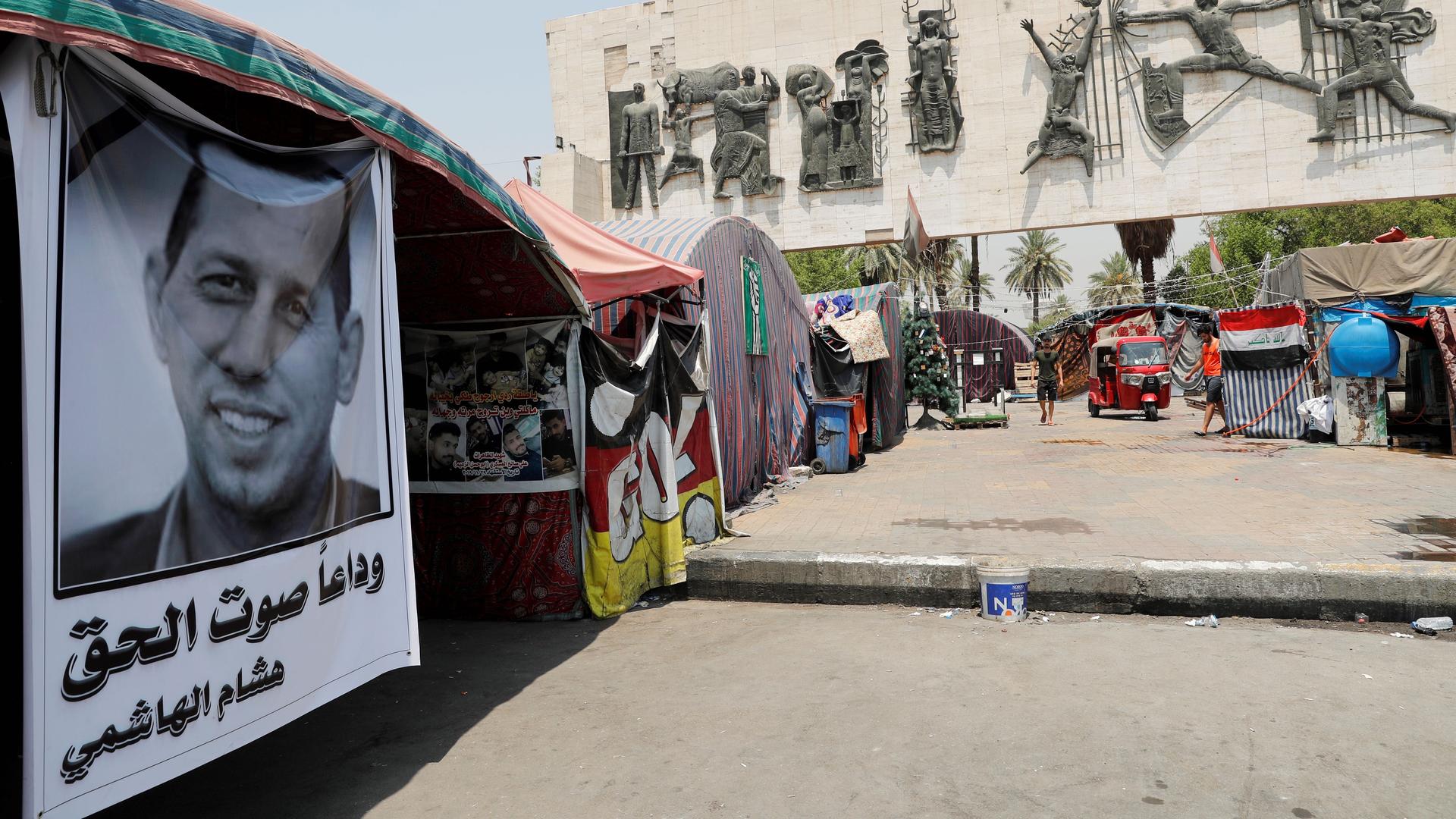Four men on motorcycles arrived outside of 47-year-old Husham al-Hashimi’s house in darkness on Monday.
When Hashimi, a prominent security expert in Iraq, pulled up in his car, one of the men approached the vehicle and started shooting. Then, the gunman ran back to his motorcycle and the group sped off.
Related: Before coronavirus, young Iraqis held some of the biggest protests in the country’s history
Those last moments of Hashimi’s life were captured on CCTV footage. His death in Baghdad has left many in Iraq and beyond in shock.
“Everyone is not believing the news,” said Muhammad al-Waeli, a PhD student and an editor for a website called 1001 Iraqi Thoughts in Baghdad.
“Husham al-Hashimi appeared on TV less than an hour before he got assassinated,” Waeli said.
Hashimi had a deep knowledge of ISIS and other jihadi militant groups. He published several books and worked with research centers in the UK and the US. He was an informal adviser to the Iraqi government and made regular TV appearances.
“I don’t think anyone who worked on Iraq didn’t know him and hadn’t interacted with him.”
“I don’t think anyone who worked on Iraq didn’t know him and hadn’t interacted with him,” said Fanar Haddad, who writes about Middle East politics from London.
“He was a fountain of knowledge and was extremely generous with his time.”
Related: Kataib Hezbollah attacked the US Embassy in Baghdad. Who are they?
Initially, Hashimi’s work focused on al-Qaeda and ISIS. But over time, he started to write about the Iran-backed militia groups in Iraq, Haddad said.
Hashimi published a report about “the internal dispute” within the Popular Mobilization Forces (PMF) just days before he was assassinated. The PMF is made up of some 40 militias that were set up in Iraq in 2014 to help defeat ISIS. Some have received funding and support from the Iranian government.
But since ISIS’ defeat in Iraq, the government has sought to bring these militia groups under Iraqi security forces’ control. But they have continued to operate independently.
So far, no group has officially claimed responsibility for Hashimi’s death. But shortly after the news broke, a journalist who knew Hashimi said he had received WhatsApp messages from him, saying he had been threatened by a member of Kataib Hezbollah, an Iran-backed, Shiite militia.
Haddad said the attack’s timing was a message to Iraq’s Prime Minister Mustafa al-Kadhimi and his team.
“It was related to and in response to the raid on Kataib Hezbollah,” Haddad said.
Late last month, Iraqi security forces stormed the group’s base in southern Baghdad and arrested 14 of its members, who were allegedly planning an attack on Baghdad’s Green Zone, where the US Embassy and other foreign missions are located.
They were freed soon after when members of the militia group entered the Green Zone and demanded their release. Haddad said he expected that there would be some sort of “face-saving solution” after the raid.
“That’s how it usually works in Iraqi politics,” he said.
Related: ‘We need to talk about racism,’ these Middle Easterners say
But in the end, Hashimi likely fell victim to the power struggle between Iraq’s government and the militias.
Now, “the prime minister is in the deeply unenviable position,” Haddad said. “Face-saving solutions are very difficult to imagine given the circumstances and any sort of counterstep could lead to confrontation.”
The militia groups’ dynamics changed in January, when the US targeted and killed two of their top leaders, according to Lahib Higel, senior Iraq analyst for the International Crisis Group.
“All of this caused a lot of fragmentation and also disagreements among these groups on how to carry on with the resistance against what they call the ‘US occupation,’” she said.
Higel said some of Hashimi’s friends had encouraged him to leave Baghdad for his safety.
“But he chose to stay in Baghdad,” she said. “He saw it as his duty to carry on with his work.”
Higel, who worked with Hashimi for her research, said she will remember him as a kind, generous person.
“It’s a real tragedy for Iraqis, and I think it’s very telling of who he was just by seeing so many of his colleagues and friends burst out in tears live on TV when they try to comment on his assassination.”
“It’s a real tragedy for Iraqis, and I think it’s very telling of who he was just by seeing so many of his colleagues and friends burst out in tears live on TV when they try to comment on his assassination,” she said.
Related: US targets Assad govt and backers with toughest sanctions yet against Syria
Waeli in Baghdad said Hashimi’s assassination is a big setback for freedom of speech in Iraq.
“He had said some … things even I didn’t [agree] with,” Waeli said. “But that’s how freedom of speech is, right? You need people to say what they believe in without fear and you need to have space for debate.”
Hashimi’s body was transferred to the Iraqi city of Najaf for burial. In the wake of his death, Iraq’s prime minister fired the police commander in charge of security in the area.
Iraq President Barham Salih condemned Hashimi’s assassination on Twitter. He said the killers must be brought to justice.
But Waeli said he’s not holding his breath: “Many assassinations have happened in Iraq, and we never actually find out who it was.”
